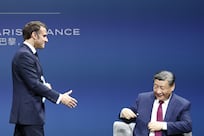Nearly a month after Hamas’s barbarous attack on Israel, I wrote that US President Joe Biden had consigned the “international rules-based order” to the dustbin of history. His administration’s near-unconditional support for the government of Israeli Prime Minister Benjamin Netanyahu while its soldiers continue waging the revenge campaign against the people of Gaza has made it abundantly clear that “rules” were for other people. America and its allies had total impunity.
That is bad enough. I now believe, however, that the damage done to the US by its “unshakeable” backing for Israel’s security, as US Secretary of Defence Lloyd Austin put it this week, is far, far more catastrophic than that. And the Biden administration appears either not to care or to be in complete denial about it.
Last week I attended the Doha Forum, Qatar's most important international affairs conference of the year. The strongly condemnatory remarks about the US’s one-sided stance from Qatari Prime Minister Sheikh Mohammed bin Abdulrahman Al Thani, Palestinian Prime Minister Mohammad Shtayyeh and Jordanian Deputy Prime Minister Ayman Al Safadi came as no surprise.
Qatar Emir says all religious, moral and humanitarian values violated in Gaza

What I had not anticipated was that almost without exception everyone I heard or spoke to would be in unanimous and passionate agreement. I witnessed only one panel participant say anything at all favourable about the US as a model of democracy and values. In my conversations with the younger Qataris present, some already in positions of responsibility, and who belong to the generations that will lead the country in the future, they were as one: they didn’t want to hear another word about US leadership, moral authority or promotion of international norms and human rights – ever.
And this, in a country that only last year was designated as a major non-Nato ally of the US and that hosts the largest US military base in the region. Another speaker, a think tank director from South Africa, said that when he was growing up he looked to the US as a leader of the free world and as a democracy. Now he looks to it as neither. Participants came from across the globe. I heard none contradict this assessment over the two days of the forum.
The senior US Republican Senator Lindsay Graham had a conversation with a moderator in a late afternoon session. He said he wanted to see a world in which Russia is humiliated in Ukraine. But the Nato-backed war in Ukraine did not appear to be a priority for many. Rather, the audience in the main conference hall felt far more in tune with Russian Foreign Minister Sergei Lavrov when he gave a one-on-one interview via video screen. People laughed at his humour – “you're much better at interrupting people than I am,” he told the host at one point – and noted his undeniably sharp replies. That didn’t mean they were all fans of Russian President Vladimir Putin, but they appreciated where Russia has stood on this issue. At a conference that was inevitably dominated by the ongoing death and destruction in Gaza, that was what counted.

At home in America, Mr Biden's coalition is cracking. Significant numbers of younger, Arab and Muslim voters will all be tempted to stay at home in next year’s presidential election, or vote for a third party candidate like Cornel West instead of Mr Biden, because his much-vaunted sense of empathy seems to have gone missing when it comes to the plight of Palestinians. Separately – not necessarily for precisely the same reasons, but it is also a factor – Mr Biden is polling relatively but unprecedentedly badly for a presumptive Democratic candidate among black voters.
Pastor Michael McBride, one of the organisers behind an open letter from the group Black Christian Faith Leaders for Ceasefire, told the Guardian newspaper: “There’s a moral dissonance in the role of the United States government in 2023 to be funding wars where poor people, people of colour, are being killed … I think this will have some kind of electoral impact.”
US actions, and inactions in the face of what Pope Francis has called “terrorism” against civilian Palestinians, also have important implications for the Biden administration’s signature Indo-Pacific strategy. This is supposed, among other things, to strengthen “relationships with leading regional partners”. Nine of these are named in the official strategy document, two of which are Indonesia and Malaysia.
Together, those two countries represent around 250 million Muslims. It would currently be political suicide for any of their aspiring or current leaders to appear to be aligned with the US on, well, almost anything. As I have written before, the Palestinian cause has deep resonance in the region. Last Sunday Malaysian prime minister Anwar Ibrahim said in an interview that he was “sick of the hypocrisy… in many of the so-called countries that promote democracy and human rights”.
The Indo-Pacific Strategy is explicit that its aims include containing China and “building a balance of influence in the world that is maximally favourable to the US, our allies and partners”. Good luck even attempting to get Indonesia and Malaysia publicly on board with that for a long time to come.
Mr Biden has lost the Arab and Muslim worlds and the Global South, he has blown a hole in his key Indo-Pacific strategy and could conceivably fail to retain the presidency over his refusal to do what perhaps only he could – demand an end to the massacres in Gaza. The consequences will be long-lasting.
Those of us who believe not only that we are moving into a multipolar world, but that it is a moral and equitable imperative that we should do so, may welcome a more modest American role in international affairs. But that is an outcome that should be reached through discussion, and through proper recognition that the post-Second World War geopolitical architecture needs drastic revisions to reflect the realities of today.
If it should transpire through global revulsion at a US administration’s willingness to tolerate murder and dispossession on a mass scale, that would be a tragic end for an America that once had at least some justification for claiming that it was a “shining city on a hill”.
Perhaps the most charitable thing one could say of the increasingly confused and infirm-looking Mr Biden and his cheerleaders – and many will not want to be charitable – would be to use words the US President will know well as a practising Catholic: “Forgive them, for they know not what they do.”






